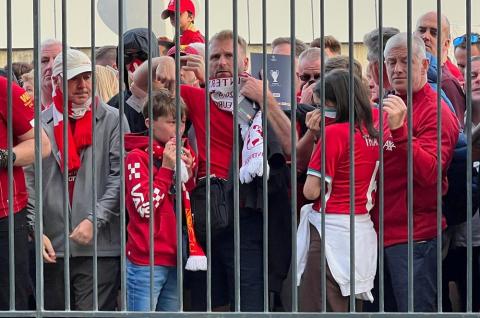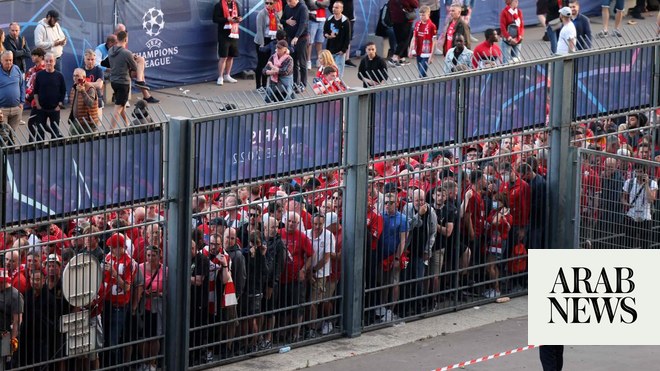
The Champions League final fiasco was a complex, multilayered organisational failure. But the events that unfolded in the hours before the game and late into last Saturday night in the surroundings of the Stade de France originate in the twisted relationship that France as a country has with football fans – one of contempt, fascination, and, ultimately, fear.
French fan culture is relatively new compared with those of other European football nations. Born in the mid-1980s, the scene was largely influenced by Italy and England, before supporters’ groups built their own identity in the 1990s. The first specific football-related security legislation goes back to 1993 and set the tone that soon became a standard for all fan-related public policies: supporters are a nuisance and need to be treated as such.
The French approach to securing football events is quite unique in Europe. It is archaic, rarely evidence-based and springs from the assumption that fans need to be managed, disciplined, controlled. Some of this comes from an outdated approach to policing all crowds, but much of it is football‑specific.
France is the only country in Europe that imposes no less than three different types of stadium bans: judicial, administrative and club-issued. We are also one of the few countries to impose serious limitations on the freedom of movement of supporters, who are regularly barred from travelling within our own country.
How is this relevant to those Liverpool fans who travelled to Paris? Away travel bans or strict travel restrictions represent an admission of failure from the public authorities, who have failed to protect supporters’ fundamental rights to the extent that they chose to limit them.
They are often based on farcical arguments such as an international kite festival or an annual farming fair to justify the lack of sufficient police forces. Earlier this season, Spurs fans were barred from entering the city centre of Rennes before a Europa Conference League game, making it theoretically illegal for them to check into the hotels they had earlier booked. This season alone, 63 domestic games were played without away fans as a result of an administrative travel ban.
It is somewhat puzzling, then, that a country that bans Mulhouse fans from travelling to Grenoble bids to host international football events at all. And this puzzle unfolded in front of our eyes last Saturday in Saint-Denis.
Liverpool fans have been the victims of two fundamental flaws in the French approach to football in general and the Champions League final more specifically. First, the arrogance of the public authorities and the delusions of grandeur that led to the repetition of age-old mistakes. The events which unfolded were largely predictable when considered separately: mobility issues around the Stade de France; excessive use of force by the police; congested stadium gates; petty crime on the access routes; tickets touts and other fake tickets around major finals. All of these risks were clearly identified and it was the responsibility of the organisers and the public authorities to address them. Instead, they were largely ignored.
Second, Liverpool fans have largely been treated in the same way as French fans. There was no special treatment here, no extraordinary circumstances for the final; they have been perceived as a threat just like for any other game played in France. And perhaps even worse, because public authorities based their risk assessment and preparation on antiquated representations of English football fans from 40 years ago. Rather than developing a proper evidence‑based approach, which would have shown that Liverpool and Madrid fans are among the most amicable in Europe, they worked backwards from a flawed conclusion, casting them as a threat to manage, an enemy to squash.
This deeply-rooted misperception guided French public authorities in the buildup to the final and explains a lot of what has unfolded since then. A few weeks ago, the prefecture of police’s plan was almost entirely focused on how to funnel Liverpool fans into specific areas of Paris to avoid any encounter with Madrid fans, an absurd objective when we remember the last two Champions League finals played by Liverpool.
This explains the show of force that was deployed around the Stade de France. Riot units and police vans were parked in very visible places by the stadium, and the general impression was that the police were dressed to impress. Liverpool fans were not welcomed as guests but treated as interlopers. Dangerous by nature, they had to understand who was in charge.
It is this dehumanisation process which led the French interior and sports ministers to the incorrect conclusions. Liverpool fans were not only seen as threat, like other football fans in my country, they were seen as worse than that as they were policed like 1980s hooligans.
The ultimate step in this dehumanisation process is the French government’s refusal to recognise Liverpool fans as victims of a failed police operation. Half-hearted apologies heard during the senate hearings and the constant praise for the good behaviour of Real Madrid fans who suffered from the same organisational flaws, show that Liverpool fans are still considered to be responsible for their own suffering.
Thanks to the media coverage and the mobilisation of supporters’ organisations such as Football Supporters Europe and Spirit of Shankly, the truth about the remarkable calmness of the Liverpool fans during the Saint-Denis debacle was rapidly established. It is them, and them only, who prevented the situation from turning into a catastrophe. Their collective response to the inhuman treatment they received will remain one of the most fascinating things I’ve seen around a football game.
We are now at the beginning of a long process which will hopefully lead to accountability and transparency. But as a French citizen, I have very little faith in the capacity of my own public authorities to look back and learn from their mistakes. The independent review announced by Uefa is a welcome first step, and Football Supporters Europe welcomed the apologies issued by the European confederation yesterday. We believe that it puts even more pressure on the ministry of the interior, the prefecture of police, and the French FA, as they maintain their absurd line of communication on the 40,000 ghost ticketless Liverpool fans.
If our government is unable to apologise to all those who suffered and feared for their lives last Saturday, we must express our solidarity with Liverpool and Real Madrid fans. For supporters’ groups, it will start soon with the French senate, which is committed to including our voices in its inquiry. But that’s only the beginning. The French government will soon realise how patient and determined football fans are in the face of adversity.












